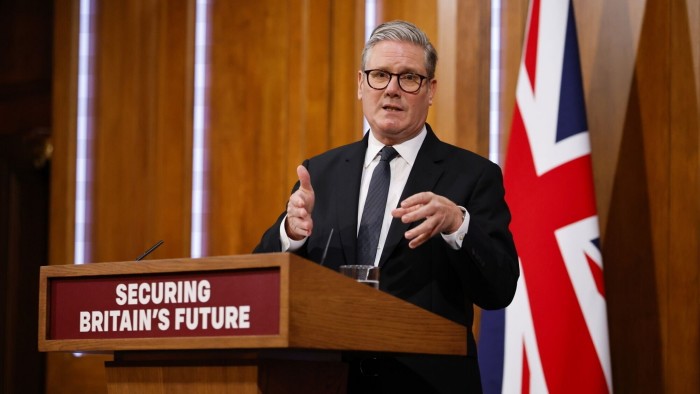Unlock the Editor’s Digest for free
Roula Khalaf, Editor of the FT, selects her favourite stories in this weekly newsletter.
UK Prime Minister Sir Keir Starmer has announced a migration crackdown to finally honour the Brexiter promise to “take back control”, warning that without action Britain risked becoming “an island of strangers”.
In sweeping reforms to Britain’s immigration system, migrants to the UK will need to spend a decade in the country before applying to settle unless they can show “a real and lasting contribution to the economy and society”.
The proposal to end automatic settlement after five years is part of planned curbs on legal migration that will also heavily restrict employers’ ability to hire overseas workers for lower-skilled roles.
Starmer told a Downing Street press conference on Monday that Britain had seen a “one-nation experiment in open borders” under the last Conservative government, adding: “That’s not control, that’s chaos.”
The prime minister said his proposed changes, described by the Tories as too timid, would end a “squalid chapter for our politics, our economy and our country” and put an emphasis on training and hiring UK workers.
Starmer refused to put a target on the cuts in migration he hoped to achieve — and has rejected a Tory proposal of an annual cap — but said: “I’m promising it will fall significantly.”
Net migration reached a peak of 906,000 in the year to June 2023 under the last Tory government, but started falling after former prime minister Rishi Sunak’s administration cracked down on family and dependant visas.
Starmer’s policies and tough rhetoric came in the month that Nigel Farage’s anti-immigration Reform UK scored major successes in English local elections and opened up a big lead in national opinion polls.
Under pressure from Reform and the Conservatives to go further, the prime minister added that if he needed to take additional steps to reduce immigration, he was prepared to do so. “Mark my words, we will,” he said.
He batted away suggestions that the crackdown on migration would further undermine Britain’s sluggish growth rate, leaving employers with gaping labour shortages and care homes struggling to find staff.
“The theory that higher migration numbers necessarily leads to higher growth has been tested in the last four years,” he said, arguing that migration had quadrupled but the economy had stagnated.
That claim is likely to be disputed by economists and employers, but Starmer insisted: “That link doesn’t hold on that evidence.”
Yvette Cooper, home secretary, said on Sunday that the overseas recruitment of care workers would end within months as a result of the changes, which will be fully set out in a white paper on Monday morning.
Other changes will limit skilled worker visas to graduate level jobs, with employers only given temporary access to visas for lower skilled roles where there are staff shortages and plans in place to train and recruit UK workers.
Cooper said the changes to lower skilled work visas would cut arrivals by 50,000 a year.




